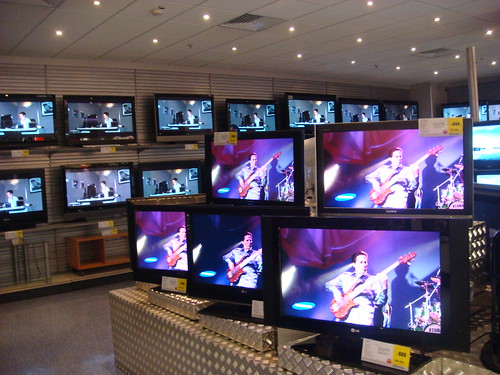High definition home theater is not quite an option for every consumer, but it is getting much closer, according to a recent report.
HDTVs with the best resolution (1080p) now start at around $1,000, and HD DVD players start at $299. As with all consumer electronics, the prices will continue to come down.
The Dallas Morning News is reporting that almost 10% of American adults plan to buy a flat-panel television this Christmas season, and 8% more said they'll go for HD during the holiday hangover clearance sales.
Here's the problem: Everyone wants a fancy new high-def television, but few people actually know how to hook them up or get HD channels on the screen. Consumers aren't even aware of what they don't know. One survey shows that about 20% of HDTV owners in the U.S. mistakenly think they're watching high-def programming when they're not. As the Dallas Morning News reports:
Consumers aren't even aware of what they don't know. One survey shows that about 20% of HDTV owners in the U.S. mistakenly think they're watching high-def programming when they're not. As the Dallas Morning News reports:
Often that's because they went into a store, bought a fancy television, went home and plugged it into their regular cable outlet and assumed they were now watching high-definition programming."People are very interested [in HD], but we also find that people aren't quite sure what that means," said a spokesman for Panasonic. "They're not really aware of what they need to get high definition."
TV makers and retailers are working to reverse that trend, because unhappy customers generally lead to returned televisions and lost sales. Your video service providers should do the same ... education about HD services can often lead to sales of premium channel packages and other digital services.
For multifamily property owners, the key is to understand that HDTVs, and particularly flat-panel TVs, are here to stay. Help residents find a way to recycle that old tube set. Work with your service provider to let your residents know what equipment they'll need to get the services they expect.
In new buildings, plan your unit layouts accordingly -- flat TVs mean that units can potentially get smaller. In the living room, reinforce the wall at the TV location, and consider adding an extra outlet higher on the wall so residents can hang their new toy.
It looks like it's going to be another busy holiday shopping season, and electronics are at the top of many wishlists ... What else can you do over the next few months to ensure that your residents are watching the big game in style come February?





